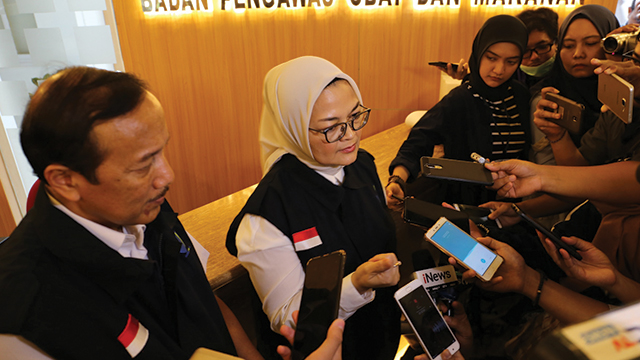Jakarta (Greeners) – During Ramadhan Month and ahead of Idul Fitri, Indonesia’s Food and Drug Agency or BPOM, reminds public on illegal food products as the agency had confiscated at least 170,000 products from 796 distribution facilities, which amounts to Rp3.4 billion or US$236,126.
Penny K. Lukito, head of the agency, said compare to food intensification data in 2018, there’s an increase on volume and economic value in 2019.
During the period, Lukito said, inspections conducted on 1,726 retailers and food distributors, of which they found 110,555 food products from 591 distributors did not meet standards, with economic value reached more than Rp2.2 billion or US$152,575.
“The increase on volume and economic value is due to increased scope of monitoring on food intensification to districts and cities. For Ramadhan and Idul Fitri, the needs and demands for food products, especially processed food products, will be intensified for its monitoring until after Idul Fitri,” she said.
READ ALSO: Surabaya Drugs and Food Agency Destroys Billions of Rupiah Illegal Products
Furthermore, she adds that monitoring will be targeted on processed food without permits, illegal, expired or damaged, and street food for fast breaking or takjil for potentially contain dangerous substances, such as formalin, borax, and banned rhodamin B and methanyl yellow for food coloring.
The agency conducted food monitoring during Ramadhan month and before Idul Fitri in three phases, — April 22 – 28, April 29 – May 4, May 5 – 11 –, in 2019.
Based on press release, the third phase monitored 1,834 retailers and food distributors comprises of 1,553 retailers and 281 food distributors or importers. Based on the inspection, there were 170,119 damaged food product packaging, expired, and illegal, confiscated from 796 distributors, with economic value reached Rp3.4 billion (US$236,126).
READ ALSO: Indonesia’s Drugs and Food Law Will Be Set in 2019
Expired products found mostly in Kendari, Jayapura, Mimika, Palopo, and Bima, in the forms of milk products, syrups, flours, snacks and biscuits.
For damaged food found in Palopo, Banda Aceh, Bima, Kendari and Gorontalo, mostly milk products, cereals, tea, canned fish, and flavored drinks.
For illegal food products mostly found in Kendari, Tangerang, Makassar, Baubau and Banjarmasin, on salt, snacks, chocolate, bottled drinks, and flavored drinks.
For takjil, 83 out of 2,804 samples or 2.96 percent, checked by the agency are not qualified. They are divided into four groups, — jelly, colored drinks, noodles, and snacks –.
Dangerous substances found in food products mostly are formalin (39.29 percent), borax (32.14 percent) and rhodamin B (28.57 percent).
“Compare with food intensification in 2018, this year saw a decline of takjil which does not meet the standards. On the Phase III in 2018, samples not meet the standards is 5.34 percent, which means awareness and understanding of takjil sellers, mostly household wives, for food security is increasing,” she said.
Reports by Dewi Purningsih



















































